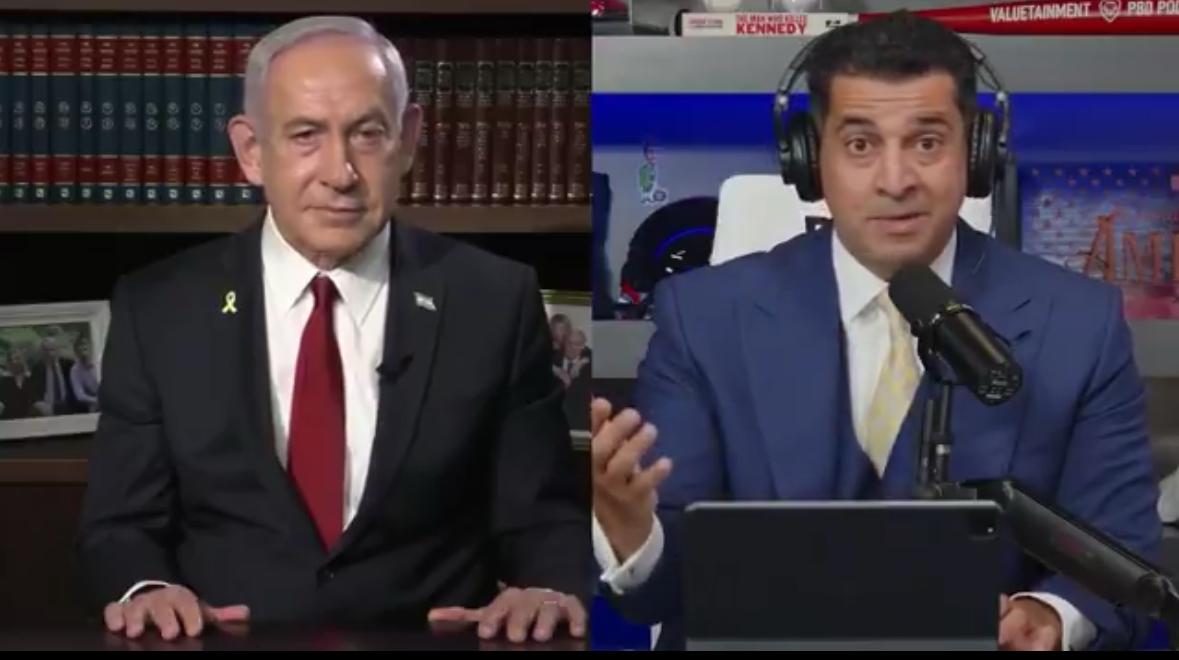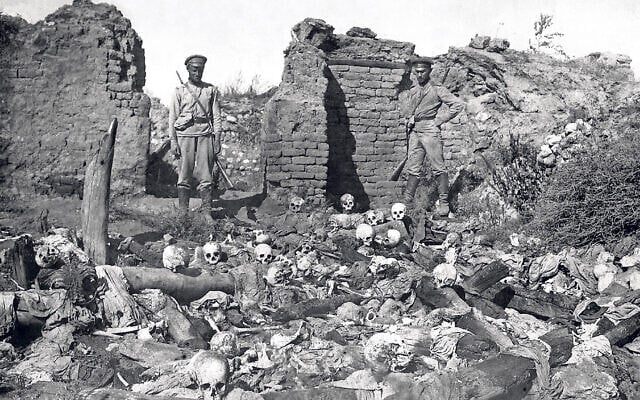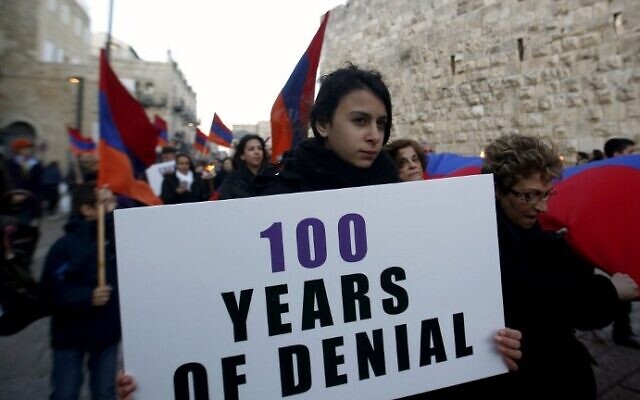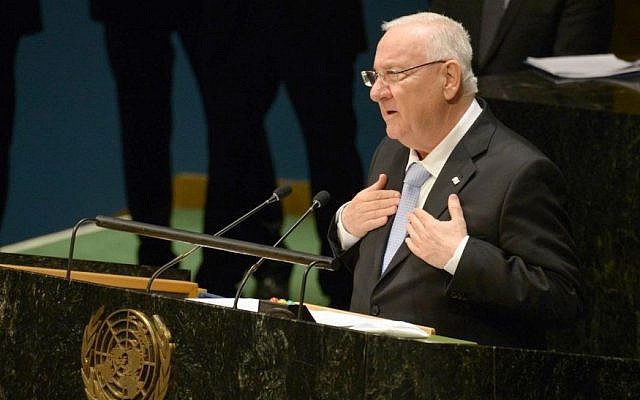



Prime Minister Benjamin Netanyahu said on Tuesday for the first time that he recognizes the genocide carried out by Ottoman Empire against Armenians, Assyrians and Greeks in the early 20th century.
Asked by Patrick Bet-David on his podcast why Israel does not recognize the Armenian genocide, Netanyahu said, “I think we have. I think the Knesset passed a resolution to that effect,” though no such legislation has been passed into law.
Pressed on why no Israeli prime minister has recognized the genocide, Netanyahu responds, “I just did. Here you go.”
Bet-David hails from an Assyrian Christian family from Iran.
Armenians have long sought international recognition of the killings by the Ottoman Empire, which reportedly left some 1.5 million of their people dead, as a genocide. Turkey — the Ottoman Empire’s successor state — strongly rejects the allegation that the massacres, imprisonment and forced deportation of Armenians amounted to genocide.
On April 20, 1965, Uruguay became the first country to recognize the Armenian Genocide.
But the vast majority of the world refuses to formally refer to the events between 1915 and 1923 — during which Ottoman forces massacred Armenian citizens in a systematically planned act of ethnic cleansing — as genocide, out of concern for their ties to Turkey, which maintains the second-largest standing military in NATO and is a powerful, relatively pro-Western Muslim power in the Mediterranean and Middle East.
To date, only 34 governments have recognized the genocide.
Israel, which for years saw Ankara as a key trading and sometime security partner, remained firmly in the majority camp. But ties have reached new lows during the ongoing war in Gaza. Turkey’s President Recep Tayyip Erdogan is an avowed supporter of Hamas and one of the leading critics of Israel on the world stage, and his country has frequently praised the Iran-backed Palestinian terror group’s October 7, 2023, attack that started the ongoing war, when thousands of terrorists invaded southern Israel from the Gaza Strip, killing some 1,200 people and taking 251 hostages.

Some maintain that the Holocaust’s unique nature prevents Israel from recognizing the Armenian genocide, out of a fear of having the industrial slaughter of one-third of the world’s Jews relegated to just another among a string of genocides throughout history.
But most point to the relationship with Ankara, a regional power. Supporters of this position see the cry that emerged from the death camps of “Never Again” as a moral imperative, meaning the Jews and the Jewish state must prioritize making sure they are never subject again to slaughter, even it means making realpolitik alliances with unsavory partners.
At the same time, there is no shortage of Israelis who argue that the Jewish experience in the Holocaust obligates the country to lead the world in showing recognition when others suffer similar fates — in effect, understanding “Never Again” the opposite way.
Many leading Jewish groups, including the Anti-Defamation League and the Union for Reform Judaism, recognize the Armenian genocide.
But Israeli leaders stood firm.
In 2001, when relations with Turkey were at an apex, then-foreign minister Shimon Peres outright denied “Armenian allegations,” denouncing them as an effort to create a parallel with the Holocaust.
“Nothing similar to the Holocaust occurred. What the Armenians went through is a tragedy, but not genocide,” he said.
Yet there have also been attempts by prominent politicians to move Israeli policy.
In 2000, then-education minister Yossi Sarid of the left-wing Meretz party announced plans to place the Armenian genocide on Israel’s history curricula. “Genocide is a crime against humanity and there is nothing more horrible and odious than genocide. One of the objectives of our education — our main objective — is to instill sensitivity to the harm to the innocent based on nationality alone,” he said on the 85th anniversary of the massacre. “We Jews, as principal victims of murderous hatred, are doubly obligated to be sensitive, to identify with other victims.”
More than a decade later, in June 2011, it was MK Arye Eldad of the far-right National Union party who introduced a bill to declare every April 24 Armenian Genocide Remembrance Day. A few weeks earlier, the Knesset had held its first discussion on recognizing the genocide. A majority seemed to support recognition, but the issue was never put to a vote.
Even Israel’s previous president, Reuven Rivlin, was an outspoken advocate for the recognition of the Armenian genocide. “It’s unthinkable for the Knesset to ignore this tragedy,” Rivlin said when he was the Knesset speaker for the Likud party, before becoming president. “We demand that people don’t deny the Holocaust, and we can’t ignore the tragedy of another nation.”
But as president, his priorities shifted dramatically. During a 2015 UN address, Rivlin spoke at length about the massacre of Armenians a century before. But he tiptoed around recognition. Speaking in Hebrew, Rivlin referred to the retzah bnei ha’am ha’armeni, which means “the murder of the members of the Armenian nation,” which hints at the Hebrew term for genocide, retzah am, but falls shorts of using the term itself.
He also decided as president not to renew his signature on an annual petition calling on Israel to recognize the genocide.
A 2018 Knesset vote on recognizing the genocide was canceled due to a lack of coalition support.


